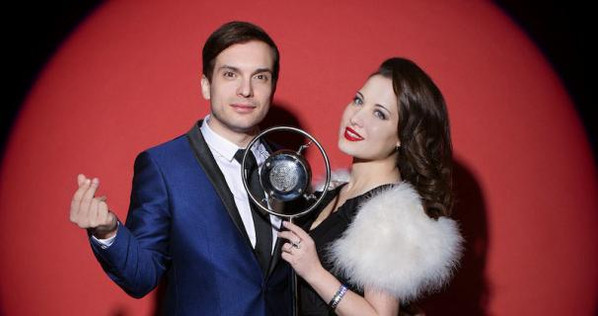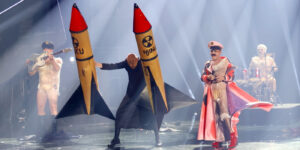Credit: BBC
If you were a Eurovision fan back in 2015, you’ll either remember where you were on the fateful evening of March 7th when the BBC revealed the UK’s entry for Vienna, and/or your reaction to it.
It wouldn’t be correct of me to say UK entries hadn’t occasionally come with an overwhelming sense of shock from fans, note: ‘That Sounds Good To Me’ in 2010, ‘Even If’ in 2008, ‘Teenage Life’ in 2006 and of course, who could forget the drama that was Cyndi being announced as the winner of ‘Eurovision: Making Your Mind Up’ by Terry Wogan in 2007, even though Scooch were in fact the winners.
None of those however were met with quite the disbelief – or outrage – that ‘Still In Love With You’ by Electro Velvet received.
In this article, we’ll take a chronological look back at the United Kingdom in Eurovision 2015, including the impact it left on the UK in the contest for future contests.
The Internal Selection
In 2015, the BBC once again opted to go internal. Since 2011, the BBC had been selecting entries without help from the public, with varying results. Blue came 11th in 2011, Englebert Humperdinck and Bonnie Tyler placed 25th and 19th, and 2014’s Molly was one of the frontrunners to win, yet only came 17th with ‘Children Of The Universe’.
Molly was unknown to the public, unlike her predecessors, and was selected through BBC Introducing. Whilst it wasn’t a great result for the UK (as we thought at the time – it’s now the 3rd best UK result of the 2010s), people to this day still believe the BBC should look to Introducing in order to pick artists. The platform has been behind the discovery of now well-known superstars like Ed Sheeran and Lewis Capaldi, and the potential of it being involved with Eurovision was an exciting prospect.
An act that was rejected for Eurovision 2014 revealed the email they received from the BBC, which outlined what they were looking for from their Eurovision entry. They considered:
- Instant appeal
- Memorable hooks
- Live vocal impact
- How the song builds
On October 6th 2014, the BBC opened submissions for ESC 2015, which remained open until November 7th. Guy Freeman – the Head Of Delegation for the UK – said that the BBC was talking with record companies and organisations in order to find a viable entry for the 2015 contest. When the submissions closed, it was revealed that just under 300 were received – a surprisingly low amount for a country with such a globally known and strong music industry. The entries were shortlisted, and the chosen one came from the online submission process – it was to be revealed on March 7th, on the show ‘Our Song For Eurovision 2015’ which was broadcast on the BBC Red Button Service.
That evening we were introduced to Electro Velvet. The band was comprised of Bianca Nicholas, a former contestant on The Voice and X Factor and Alex Larke, a singer in a Rolling Stones tribute band. ‘Still In Love With You’ is described as a 1920s influenced, electro swing song. It’s safe to say we haven’t heard anything like it before, or after, in the contest.
Build Up To Eurovision
The song received mixed-negative reviews from fans, the public and the media. It was criticised for weak vocals and stage production, and if Alex throwing in some scatting halfway through isn’t your thing, it’s not hard to see why. The Independent referred to it as ‘instantly forgettable’, and The Guardian were even harsher calling it ‘nightmareish’. It reached #63 on the downloads chart and #114 in the Offical UK Charts.
The song was also compared to the 1980’s advert soundtrack for Birdseye Potato Waffles. Take a listen below and see what you think.
Despite the negative response, the pair remained positive. Alex said that he liked that it dived public opinion, and Bianca said it was likely to stand out as 2015 had a lot of ballads, and that it was a party song that was ‘really fitting’ for Eurovision’s anniversary. They gave their first performance of it at the end of ‘Eurovision’s Greatest Hits’, a show celebrating 60 years of the contest hosted by UK commentator Graham Norton and Petra Mede – host of Eurovision 2013, and future 2016 host.
At Eurovision 2015
During rehearsals for the final, Electro Velvet faced multiple issues with their costumes. The staging was set up like the music video, and Bianca and Alex had outfits that were covered with LED lights that would switch on as the stage lights went down during the non-singing parts of the chorus. These lights didn’t always work during the run-throughs, but luckily on the night, everything went to plan.
It has been rumoured that this outfit choice was in fact an idea the BBC got after seeing Danny Saucedo perform ‘Amazing’ at Melodifestivalen 2012 (which came 2nd to ‘Euphoria’ by Loreen). Whilst never confirmed, they were said to be so impressed by the staging that they decided to implement it in the UK’s live performance for 2015 – however it wasn’t as effective as what Danny and his dancers managed to pull off 3 years earlier. You can see his performance below.
The UK drew the first half and was selected to perform 5th, after ‘Goodbye to Yesterday’ from Estonia and before Armenia’s ‘Face The Shadow’. During the performance, users took to social media to joke that the EU would be holding a referendum to kick the UK out instead of the proposed 2016 vote for the UK to leave the EU instead. Others said they were ‘hanging their heads in shame’ and that it was another ‘0 Points’.
If we forget the song for a second and look at the lineup for 2015’s final, it was almost obvious at least one male/female duo would miss out. In the final alone, there were four duos, with all of them being within the first 10 songs. These were: Elina Born and Stig Rästa from previously mentioned Estonia, who came 7th, Monika Linkytė and Vaidas Baumila from Lithuania, who came 18th, Norway’s Mørland and Debrah Scarlett, who came 8th, and of course Electro Velvet.
By the end of the voting, the UK finished 24th with only 5 points – 24th in the televote and 23rd in the jury. Ireland and Malta gave the song one point, whilst San Marino gave it three. That year, the UK gave their 12 to the eventual winners, who finished 360 points ahead of the nation. Måns Zelmerlöw’s song ‘Heroes’ saw Sweden win with 365 points, one of the contest’s most successful winners, and a second win for the country within 5 years. Måns eventually ended up being the host of the UK’s national final You Decide in 2018 and 2019, and has remained highly involved with Eurovision ever since. Electro Velvet, on the other hand, have not – and usually are only mentioned in the Eurovision context with disdain and occasional confusion and still disbelief over the BBC’s selection of them.
After Eurovision – Where Are Electro Velvet Now?
After Eurovision, Alex gave an interview detailing his Eurovision experience. He said he didn’t apply for Eurovision, and that Electro Velvet was actually made up of Bianca and a different man who’d auditioned for X Factor, but was slated by the panel. When he pulled out, the director of the ‘Still In Love With You’ video asked Alex if he’d like to take part, to which he said yes. He also claimed that big names and songwriters had submitted songs to the BBC for 2015.
Alex said that Electro Velvet wasn’t a novelty act and that they were paying a genuine homage to the music and culture of the 1920s. They weren’t expecting hate, and he believes the BBC weren’t either – apparently, everyone at the broadcaster thought the entry was great, fresh and new, and really thought people were going to love the song. Due to this naivety, the reaction to the song took everyone by surprise. During the voting his parents walked out because they weren’t expecting such an awful response – everyone was ‘gutted’ with how they did.
Another point he made was that political voting exists, but it only affects those toward the end of the table as they get pushed further down. This is a typical excuse often used to explain bad results, that we explore in our article surrounding British media which you can read by clicking here.

He referred to the costumes as “hideous” to get into due to the fragility of the LED lights. His costume ALONE cost the BBC £50,000. As of 2021, the BBC is rumoured to pay the EBU a £310,000 fee for its services. Therefore, many will question why, when they have such a big budget leftover for Eurovision, this money is being spent on some light-up LED suits and dresses and not on a quality entry and staging that would return the UK to a Eurovision powerhouse status they held prior to the new Millenium.
In 2017, he revealed that he’d like to return to the contest for Greece, as this is where his mother comes from.
Despite the duo telling the Daily Star that they planned to continue with the band, it soon became obvious that they were no longer making music together, as their Eurovision entry remained the only song in their discography up until 2018 when a song called ‘Take Me Home’ appeared online. Alex said he’d asked Bianca to continue the group but she said no. Their planned EP was cancelled due to her health.
As for Bianca, she has co-founded the Cystic Fibrosis Vocal Choir – something she herself has spoken about suffering with and the impact it can have on her performing ability.
In November 2015, she posted a statement on Facebook, which revealed her views toward Eurovision and the impact it had on her. She said that she’ll go down in history as a ‘joke’ and won’t ever have the same amount of media attention to change this perspective of her. She said that she too wasn’t prepared for the hate and trolling she received.
Bianca also revealed that she didn’t sing a lot since the contest and found gigging difficult. She couldn’t even sing in her own company as she felt so ashamed of herself.
The Impact On The UK, BBC and Lasting Legacy
With the overwhelming outrage surrounding the entire selection for Eurovision in 2015, the BBC opted for a national selection – the first for the country in 6 years. You Decide saw six songs compete for the chance to represent the UK. The shows were hosted by Mel Giedroyc – then the UK semi-final commentator – every year, who was later joined by Måns as previously mentioned. The show’s run lasted until 2019 when Michael Rice ended up coming last at Eurovision with ‘Bigger Than Us’. The best result within this time period was in 2017, when Lucie Jones reached 15th with ‘Never Give Up On You’, the 4th best result for the UK since 2000.
In 2020 and 2021, the BBC worked with the record label BMG. ‘My Last Breath’ by James Newman was selected, but the contest was cancelled due to the coronavirus outbreak. In 2021, he was selected to enter with ‘Embers’ – it got 0 points overall, the second time in the UK’s history and in a system designed to avoid that scenario happening. After the contest, BMG soon seemed to no longer be involved with the BBC. It’s not known whether they decided to leave, or if the BBC decided to drop them from their selection process. In 2022 TaP music – a management company behind acts such as Lana Del Rey, Little Mix star Leigh-Anne Pinnock and formerly Dua Lipa, came in to help the BBC and attempt to get the UK back to being successful at Eurovision again. TikTok sensation Sam Ryder – who across social media boasts a combined 17 million followers – has been chosen to send his song ‘Space Man’ to Turin. At the time of writing, it is currently sitting at 4th in the odds and is beginning to find success across European countries. Sam is also on a promotional tour with the song, and a contest organiser has recently said the staging will be ‘one to watch’. Right now we don’t know how well Sam will do in Italy, but we hope it’s a turning point for the BBC.
Electro Velvet is still to this day spoken about as a low point for the BBC, but there is an unfortunate and sad underlying mood to their selection, especially with what we now know from Alex and Bianca. The lack of support and preparation for the criticism clearly impacted them, and there was, from Bianca’s statement, an assumed lack of after support for the artists from the BBC or EBU to make sure they could deal with the results and the online hate. Bianca may not have the large media attention surrounding her anymore, and the unfortunate reality of her situation is this – no matter what, the criticism will almost always be directed towards the artist, and not towards those behind the selection. James Newman was heavily scrutinised and tied to the staging and song when for someone with little to no performing experience, he was already disadvantaged by the broadcaster. It is quite simply wrong to assume someone could stand up on stage and sing perfectly to an audience of 200 million people with their debut performance, when they have no previous practice or don’t have the necessary stage presence. Both James and Michael Rice have also now removed all traces of their Eurovision experience from their social media.
The artists are not responsible for the BBC’s failings. If we can give Bianca and all other UK Eurovision artists anything it should be the support they need both before and after the show. It is ok to be disappointed, and it’s fine to say how you feel about the overall performance, but directly attacking the artist and mentioning them in your posts will obviously affect them, especially when they’re new to the world of being a public figure on one of the biggest platforms in the world.
When we look back over the UK in the 2010s, Electro Velvet may stick out for the wrong reasons, but if anything it was unique, and clearly a risk the BBC wanted to take that just didn’t pay off. We hope both Alex and Bianca are now, 7 years later, able to be proud of the performance they gave even if it didn’t work out for them at Eurovision. There are obviously things that needed to change with the BBC, their attitude to Eurovision and their knowledge of what does well, but 2022 may reignite that spark to find success again, all being well in May.
What did you think of ‘Still In Love With You’? Be sure to let us know!





Pingback: 🇬🇧 Editorial: Are The UK Finally Opening Up To The Modern Eurovision Song Contest? – Phoenix